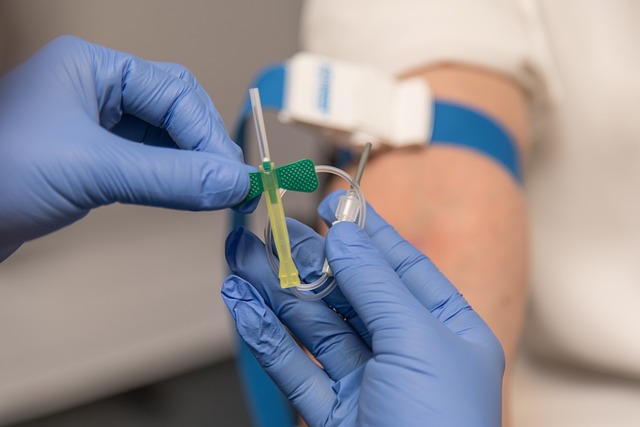Testosterone, crucial for various bodily functions in men and women, is assessed via a testosterone blood test, an essential diagnostic tool. This test measures total testosterone levels, aiding healthcare professionals in identifying imbalances leading to symptoms like low energy, decreased libido, or muscle mass loss. Reference ranges vary, but levels below 300 ng/dL are generally low, indicative of conditions like hypogonadism, while elevated levels might signal issues requiring medical attention. Accurate interpretation, combined with patient symptoms, guides treatment options including lifestyle changes and Testosterone Replacement Therapy (TRT) for optimal hormone balance and improved well-being.
Diagnosing hormone imbalances can significantly impact overall health, making a reliable testosterone blood test crucial. This comprehensive guide explores the importance of understanding testosterone—its functions and role in the body—and highlights when such testing is necessary. We delve into common symptoms associated with hormone imbalances, emphasizing the value of accurate diagnosis through blood tests. Furthermore, we provide insights into interpreting results, offering an overview of treatment options available to restore hormonal balance.
- Understanding Testosterone: The Hormone and Its Functions
- When to Get a Testosterone Blood Test: Indications and Symptoms
- Interpreting Results: Accurate Diagnosis and Treatment Options
Understanding Testosterone: The Hormone and Its Functions
Testosterone is a hormone that plays a pivotal role in the human body, primarily known for its significance in male sexual development and characteristics. However, it is also crucial for overall health and well-being in both men and women. As the primary sex hormone in males, testosterone contributes to muscle mass, bone density, red blood cell production, and libido. It influences energy levels and plays a key part in maintaining a positive mood and mental wellbeing. Understanding these various functions highlights the importance of accurate testing methods, such as the testosterone blood test, when diagnosing hormone imbalances.
The testosterone blood test is a crucial tool for healthcare professionals to assess testosterone levels and identify potential imbalances. This test involves taking a blood sample to measure the amount of total testosterone present in the body. Results can indicate whether an individual has low (hypogonadism), normal, or high testosterone levels, aiding in the diagnosis of various conditions. Accurate testing enables appropriate treatment plans, including hormone replacement therapy, to be devised and tailored to each patient’s unique needs.
When to Get a Testosterone Blood Test: Indications and Symptoms
If you’re experiencing symptoms that could point to a hormone imbalance, a testosterone blood test might be a valuable tool for diagnosis. Testosterone is a key hormone responsible for various bodily functions, particularly in men, and imbalances can lead to noticeable changes in overall health and well-being.
Common indications for getting a testosterone blood test include low energy levels, decreased sexual desire or performance issues, muscle mass loss, increased body fat, and changes in mood or cognitive function. If you’re experiencing any of these symptoms, especially if they’ve persisted for some time, consulting with a healthcare professional about a testosterone blood test is advisable. This simple procedure can help identify potential hormone imbalances and guide appropriate treatment options.
Interpreting Results: Accurate Diagnosis and Treatment Options
Interpreting results from a testosterone blood test is crucial for an accurate diagnosis and tailored treatment plan. The reference ranges for total testosterone can vary slightly between labs, but generally, levels below 300 nanograms per deciliter (ng/dL) in men are considered low and may indicate hypogonadism or hormone imbalances. Levels above 1000 ng/dL might suggest potential issues with the test itself or other medical conditions.
Once the results are in hand, healthcare professionals can compare them against symptoms presented by the patient. If low testosterone is confirmed, treatment options include lifestyle changes, such as regular exercise and a healthy diet, along with medication like testosterone replacement therapy (TRT). The goal is to restore hormone levels to an optimal range, alleviating symptoms of low testosterone and improving overall well-being.
A reliable testosterone blood test is a vital tool for diagnosing hormone imbalances, offering accurate insights into an individual’s hormonal health. By understanding when to get such a test and interpreting the results properly, medical professionals can provide effective treatment options tailored to each patient’s unique needs. The testosterone blood test plays a crucial role in navigating and addressing hormone-related issues, ultimately enhancing overall well-being.
